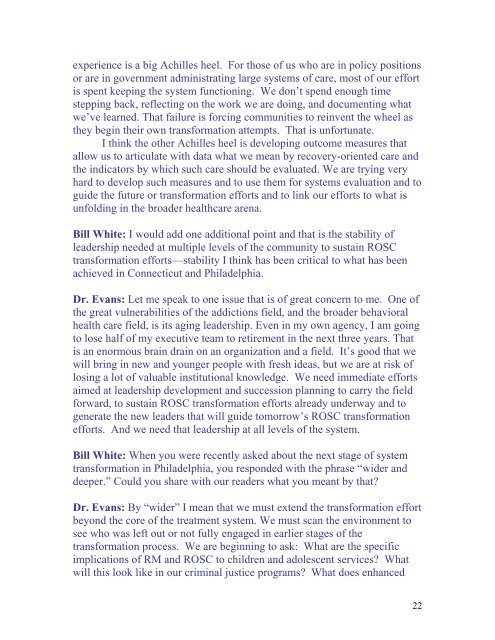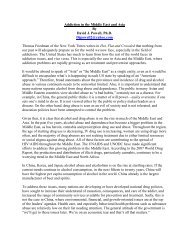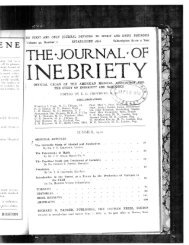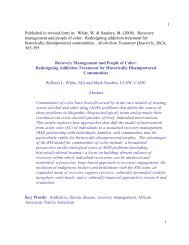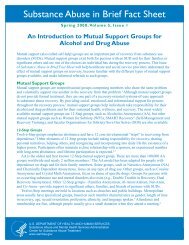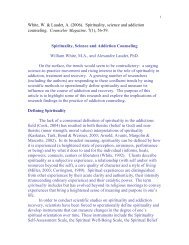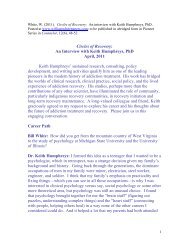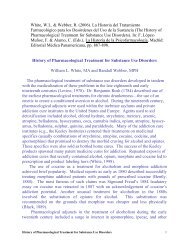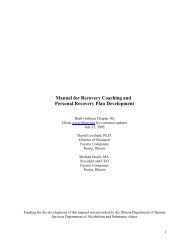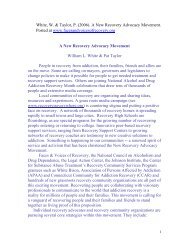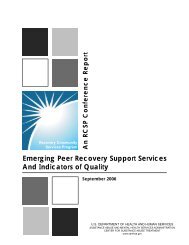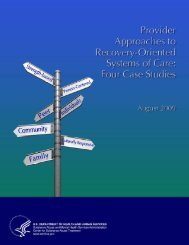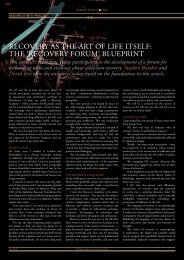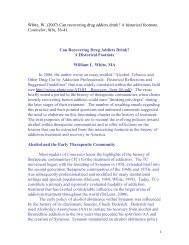An Interview with Arthur C. Evans, Jr., PhD Dr. Arthu - William L. White
An Interview with Arthur C. Evans, Jr., PhD Dr. Arthu - William L. White
An Interview with Arthur C. Evans, Jr., PhD Dr. Arthu - William L. White
- No tags were found...
You also want an ePaper? Increase the reach of your titles
YUMPU automatically turns print PDFs into web optimized ePapers that Google loves.
experience is a big Achilles heel. For those of us who are in policy positionsor are in government administrating large systems of care, most of our effortis spent keeping the system functioning. We don’t spend enough timestepping back, reflecting on the work we are doing, and documenting whatwe’ve learned. That failure is forcing communities to reinvent the wheel asthey begin their own transformation attempts. That is unfortunate.I think the other Achilles heel is developing outcome measures thatallow us to articulate <strong>with</strong> data what we mean by recovery-oriented care andthe indicators by which such care should be evaluated. We are trying veryhard to develop such measures and to use them for systems evaluation and toguide the future or transformation efforts and to link our efforts to what isunfolding in the broader healthcare arena.Bill <strong>White</strong>: I would add one additional point and that is the stability ofleadership needed at multiple levels of the community to sustain ROSCtransformation efforts—stability I think has been critical to what has beenachieved in Connecticut and Philadelphia.<strong>Dr</strong>. <strong>Evans</strong>: Let me speak to one issue that is of great concern to me. One ofthe great vulnerabilities of the addictions field, and the broader behavioralhealth care field, is its aging leadership. Even in my own agency, I am goingto lose half of my executive team to retirement in the next three years. Thatis an enormous brain drain on an organization and a field. It’s good that wewill bring in new and younger people <strong>with</strong> fresh ideas, but we are at risk oflosing a lot of valuable institutional knowledge. We need immediate effortsaimed at leadership development and succession planning to carry the fieldforward, to sustain ROSC transformation efforts already underway and togenerate the new leaders that will guide tomorrow’s ROSC transformationefforts. <strong>An</strong>d we need that leadership at all levels of the system.Bill <strong>White</strong>: When you were recently asked about the next stage of systemtransformation in Philadelphia, you responded <strong>with</strong> the phrase “wider anddeeper.” Could you share <strong>with</strong> our readers what you meant by that?<strong>Dr</strong>. <strong>Evans</strong>: By “wider” I mean that we must extend the transformation effortbeyond the core of the treatment system. We must scan the environment tosee who was left out or not fully engaged in earlier stages of thetransformation process. We are beginning to ask: What are the specificimplications of RM and ROSC to children and adolescent services? Whatwill this look like in our criminal justice programs? What does enhanced22


